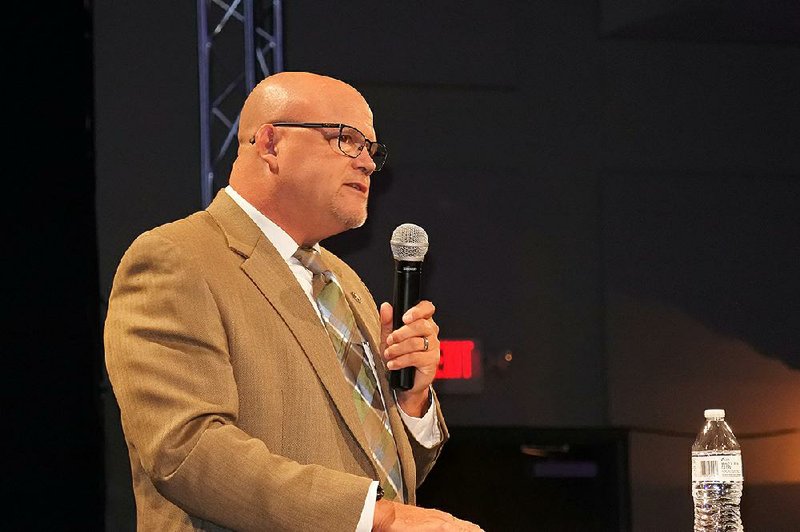FORT SMITH — Sebastian County residents were able to learn more about the opioid epidemic on both nationwide and local levels on Friday.
The Sebastian County Opioid Task Force hosted a summit called “In Our Own Backyard … Addressing Opioids in Our Community,” at Grace Community Church in Fort Smith on Friday. The summit ran from noon to 5:15 p.m., and its goal, according to a news release, was to reduce opioid abuse in Sebastian County and support legislation and policy changes to address the opioid crisis.
Sebastian County Sheriff Hobe Runion said that from 2000 to 2017, the average state imprisonment rate in the country dropped by 8%. However, this rate increased by 35% in Arkansas during that same period of time.
Arkansas also currently has the fastest growing prison population, and the fourth highest imprisonment rate, in the nation, Runion said. Among other statistics he provided were that, since 2014, the state has had a recidivism rate of 57%.
“So, we also know that of these people we’re talking about, a large percentage of them have addiction issues, substance abuse issues with opioids,” Runion said.
“So these numbers, which are just numbers, what do they tell us? They tell us that law enforcement cannot be successful without the rest of the community. We frequently end up as the first and last resort, but many times, these people don’t have the opportunity before their interaction with law enforcement to get any help.”
The featured speakers at the summit consisted of experts in a variety of fields. One of them was Cheryl May, director of the Arkansas Criminal Justice Institute. May said 11.4 million Americans misused opioids in 2017. 2.1 million Americans were diagnosed with an opioid use disorder, and of this number, 55% of them got treatment for heroin use disorder and 21% got treatment for prescription pain reliever use disorder.
In 2017, May said, over 70,000 people in the country died from a drug overdose. Two-thirds of these deaths were related to heroin and synthetic opioids, such as fentanyl.
“Over 70,000, that equals 192 people every day dying from a drug overdose,” May said. “That’s equivalent to 130 people dying every day from an opioid overdose.”
May said there were 426 total drug overdose deaths in Arkansas during 2018, according to statistics provided by the Arkansas Department of Health. The counties that had the most of these were in the central, western and northwestern parts of the state, with Sebastian County having 18.
May also went into detail about opioid prescribing rates, meaning opioid prescriptions per 100 people, across Arkansas for 2018. The data, which came from the Arkansas Prescription Drug Monitoring Program, stated the overall rate for Arkansas that year was 102.1, with Sebastian County having the same rate.
Over 3.2 million prescriptions for opioids were written in the state in 2018 as well. Hydrocodone was the most prescribed opioid, ahead of tramadol, oxycodone, codeine and morphine.
“The United States makes up about 5% of the world’s population, but uses 40% of the pharmaceuticals produced, and 99% of all hydrocodone products manufactured in the world,” May said.
Among the others who spoke at the summit were Sebastian County Judge David Hudson and Sebastian County District Judge Jim O’Hern. Those who attended the summit could also participate in “breakout sessions” that were each devoted to a specific subject with different people leading them.
The summit concluded with a panel discussion in which individuals answered questions from the audience.
